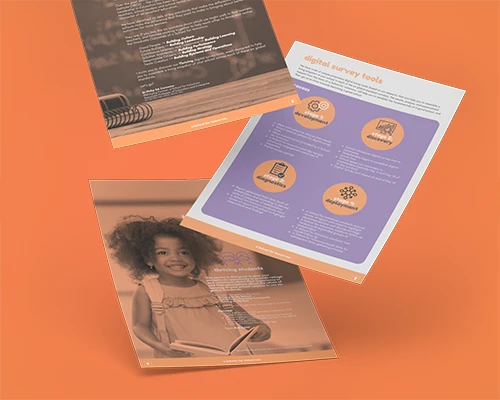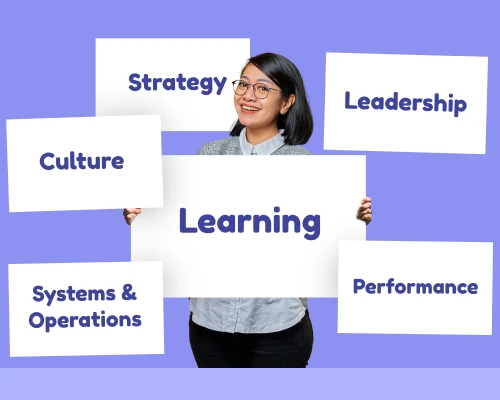
Dr Phil Cummins
Apr 16, 2023 | 4 minute read
Student Voice and School Systems & Operations
Dr Phil Cummins interrogates how school systems & operations can value the voice of students.
Promotion
a School for tomorrow's
A School for tomorrow. Readings
Access our free study program for students, teachers and leaders who want to take the big step forward and up.
Let's go!Systems and operations in schools must be more than efficient and effective in describing and ordering how the warp and weft of daily life meshes together. They must bring people together to do the work of a community of inquiry and practice in which students rehearse and refine their voices in preparation for constructive and productive contribution to the team and societies that they serve throughout their lives.
The role of systems and operations in schools is to find new and better ways to improve outcomes for more learners, their families and the staff and community members who support them. The processes and procedures we use to administer life in a school, therefore, need to be especially deliberate about how best to support the development and promotion of student voices that in turn exemplify the intentions of the school’s ethos and strategy, particularly through:
- Relationships, Teamwork & Collaboration: students should enjoy working in teams and contribute actively to build a positive and healthy culture of cooperation and competitiveness within them.
- Trust, Belonging & Connection: students should feel as though they belong in the school and rarely (if ever) feel ignored or on the sidelines in their classes and activities at the school.
Relationship, teamwork and the connections and norms on which they depend, are integral for the success of our students as they seek to earn their place and create a sense of belonging in school and the community.
Systems and operations need to help people collaborate fully:
“It is in relationship with others that you will truly find your voice so that you can positively and meaningfully contribute your ideas ... These relationships will also help you to direct your agency and your advocacy on behalf of others. It is the combined impact of these that will help you to determine the impact you have upon people you live with in community throughout your life.”
Ref: www.aschoolfortomorrow.com/the-pathway-to-excellence/live
Expert teachers support their students to become team creators who have the relationality to work effectively and respectfully and in a structured, productive and deeply satisfying fashion within their diverse teams. Their practice gives structure to the stated and unstated knowledge, skills, dispositions and habits of individuals and their teams with a special emphasis on:
- Relationships, Teamwork & Collaboration: teachers give all students an opportunity to learn through challenge and growth in a variety of roles and provide them with clear feedback about their effectiveness in working together in teams.
- Trust, Belonging & Connection: learn what makes all of their students “tick” and will adjust or tune their working relationship with them accordingly, in order to motivate, support and challenge them in their learning journeys.
Our Global Educational Research Program reveals that our colleagues in schools across the world acknowledge the importance of relationship in helping students grow – the need to create a psychologically safe space in which voice might emerge and strengthen is particularly important. We believe there is an ongoing opportunity for teachers to develop an even deeper understanding of what we call “character apprenticeship” – a pedagogical approach grounded in the teacher-student relationship, that supports the development of voice and those graduate outcomes, through which students acquire and apply progressive levels of mastery in character, competency and wellness.
We need to show our students how to become team creators with the capacity to work in relationships with others to bring success and fulfilment to all by recognising and celebrating our individual contributions and enhancing our shared humanity.
Often referred to as ‘human’ or ‘soft’ skills, the global educational research program of a School for tomorrow has identified six core Employability Skills. Educating for Student Voice is enabled by the nurturing of teamwork. Yet it needs to go further than participation in a team – we need to help our learners how to go about creating and sustaining teams. This, of itself, invests in them a different type of agency, one which gives the young people in our care a responsibility and the social power to do something about it which might have been exercised by adults in an earlier time. Yet this is not the past and today’s learning for tomorrow’s world demands something fit for purpose.
We're not going to solve today’s complex problems by business as usual. And so why should education be education as usual?
Hayley McQuire | Game Changers insight*
|
Quality |
Attributes |
Capabilities |
|
Teamwork |
Collaboration |
I understand my specific role in a team and how I can collaborate to best utilise the skills of others. |
|
Cooperation |
I am able to move beyond differences of opinion with my team members to act in ways that benefit the organisation. |
|
|
Respect |
I work effectively with people of different ages, gender, ethnicity, religion, ability, sexual orientation, or political persuasion. |
|
|
Ethical Conduct |
I work ethically to achieve the best outcomes for my organisation and community. |
|
|
Team Wellbeing |
I spend time helping people in my organisation to be healthy and happy. |
|
|
Professional Culture |
I contribute to a culture of high performance and success through my professional conduct. |
Around the world, we have seen successful school leaders creating systems and operations** that recognise, endorse and actively promote the values and value proposition of creating teams that are homes for the relationships which become the essential foundation for encouraging student learning, growth and the voices that spring from them. As Adriano and I assert in our recent book***,
Connection is the basic task of team leadership. No matter our role in schools, no matter the scope of our roles and no matter how grand our ideas are, we need to connect people through teams [and] to the notion that working for and with each other is better than working for and by ourselves.
Ref: Game Changers: Leading Today's Learning for Tomorrow's World (Hawker Brownlow Education 2022) p.157
Let’s go!
Phil
* You can listen to Hayley McQuire’s Game Changers Episode here: https://podcasts.apple.com/au/podcast/game-changers/id1503430745?i=1000539004572
** You can learn more about the operation of school communities and how they support student voice here:
https://www.aschoolfortomorrow.com/game-changers/live/school-communities
*** Game Changers: Leading Today’s Learning For Tomorrow’s World is available for purchase here: https://www.hbe.com.au/hb1338.html
Related Content
.png)
Article
Student Voice and School Culture
Products & Services
Discover our 'Thriving' Digital Survey ToolsLike what you’ve read?
Let’s keep the conversation going.
